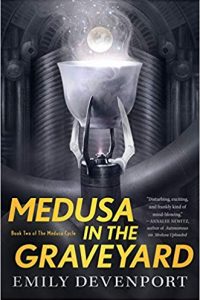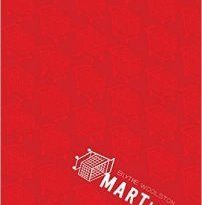Gary K. Wolfe Reviews Feed Them Silence by Lee Mandelo
 Feed Them Silence, Lee Mandelo (Tordotcom 978-1-25082-450-9, $19.99, 112pp, hc) March 2023.
Feed Them Silence, Lee Mandelo (Tordotcom 978-1-25082-450-9, $19.99, 112pp, hc) March 2023.
Last year, Ray Nayler’s The Mountain in the Sea invited us to think about how the world might be perceived by nonhuman species right here on Earth – in that case, octopuses – but some version of that question has been remarkably persistent in SF at least since Wells’s The Island of Dr. Moreau (which, as if to underline my point, has been revisited by both Daryl Gregory and Silvia Moreno-Garcia just in the past couple of years). Animal studies has also been a healthy subgenre of SF criticism for a couple of decades by now, focusing on everything from the nature of consciousness to environmental depredation. So Lee Mandelo’s novella Feed Them Silence is timely in all sorts of ways, covering a lot of this territory in a relatively short space, even though the SFnal novum at its center is notably restrained – a brain-implant technology that permits a researcher to piggyback on the experiences and perceptions of a wolf in the wild.
That researcher, Dr. Sean Kell-Luddon, has received a corporate grant to establish such a neural linkage, connecting her own brain with that of a gray wolf she calls Kate, hoping to experience, ‘‘for the first time on earth, another creature’s thinking, feeling self from the inside.’’ While this represents a lifelong dream for Sean, her wife Riya views the whole project as exploitative, ignoring the broader problems of shrinking habitats and climate change, and selfishly focused on Sean’s own career goals. Plus – for good reason, as it eventually turns out – Riya is distrustful of the corporate sponsorship. Mandelo does an effective job of evoking the sensorium of a wolf during Sean’s interfaces – the scents, hearing, tactile sensations, even sexual urges – all of which need to be somehow translated into human senses and then translated again into language by Sean. Some of the most visceral scenes involve the pack’s confrontation with a bear and their strategies for coping with a brutal cold snap.
While Sean’s growing commitment to the wolf Kate begins to look obsessive even to her research team, the other dramatic core of the book is Sean’s collapsing marriage. The dialogue in her sharp-edged arguments with Riya is hurtful, painfully honest, and entirely credible, and is far more sophisticated than the old SF sawhorse of the preoccupied scientist ignoring the family. For one thing, Riya is easily an intellectual match for Sean, with her own career priorities and opportunities, and for another, she makes some good points about the ethics and opportunism of Sean’s project. For all her idealism and commitment, Sean isn’t an entirely sympathetic character, and the concerns of her wife and her colleagues are an important part of the story’s moral complexity.
While the irony of all this isn’t particularly subtle – how can we hope to understand the perspective of a different species when we can’t even understand the humans closest to us? – Mandelo introduces yet a third perspective in the form of Sean and Riya’s herding-dog Miller, who at twice the age of the wolf pack’s male leader, ‘‘had grown to be a distinguished old gentlemen, cooped up in a vast human house all day with vacuum robots for company’’. The animal who lives with humans provides a nice counterpoint to the human trying to live with animals, and it’s clear that Miller’s herding instincts have nowhere to go in that huge house. Neither Riya nor Sean seem to have enough time for him, either, and neither seems too worried about what he’s thinking. Feed Them Silence raises important questions about consciousness, research ethics, corporate sponsorship, shrinking habitats, and the various ways we interact with our planetary companions, but it doesn’t suggest that there are many easy answers. It sets out to be a provocative tale, and it works.
Gary K. Wolfe is Emeritus Professor of Humanities at Roosevelt University and a reviewer for Locus magazine since 1991. His reviews have been collected in Soundings (BSFA Award 2006; Hugo nominee), Bearings (Hugo nominee 2011), and Sightings (2011), and his Evaporating Genres: Essays on Fantastic Literature (Wesleyan) received the Locus Award in 2012. Earlier books include The Known and the Unknown: The Iconography of Science Fiction (Eaton Award, 1981), Harlan Ellison: The Edge of Forever (with Ellen Weil, 2002), and David Lindsay (1982). For the Library of America, he edited American Science Fiction: Nine Classic Novels of the 1950s in 2012, with a similar set for the 1960s forthcoming. He has received the Pilgrim Award from the Science Fiction Research Association, the Distinguished Scholarship Award from the International Association for the Fantastic in the Arts, and a Special World Fantasy Award for criticism. His 24-lecture series How Great Science Fiction Works appeared from The Great Courses in 2016. He has received six Hugo nominations, two for his reviews collections and four for The Coode Street Podcast, which he has co-hosted with Jonathan Strahan for more than 300 episodes. He lives in Chicago.
This review and more like it in the March 2023 issue of Locus.
 While you are here, please take a moment to support Locus with a one-time or recurring donation. We rely on reader donations to keep the magazine and site going, and would like to keep the site paywall free, but WE NEED YOUR FINANCIAL SUPPORT to continue quality coverage of the science fiction and fantasy field.
While you are here, please take a moment to support Locus with a one-time or recurring donation. We rely on reader donations to keep the magazine and site going, and would like to keep the site paywall free, but WE NEED YOUR FINANCIAL SUPPORT to continue quality coverage of the science fiction and fantasy field.
©Locus Magazine. Copyrighted material may not be republished without permission of LSFF.







